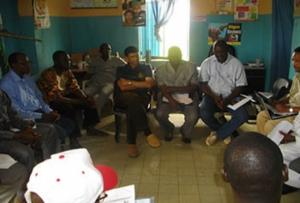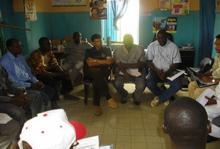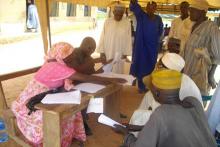Nigeria Finally Starts Population Based Tuberculosis Prevalence Survey with WHO Support
The National TB control programme under the Federal Ministry of Health has finally started a nationwide population based national TB prevalence survey. Advocacy, enumeration and data collection has started in three states in the southern part of the country. Take off is built on the experiences of the pilot survey which was conducted in March/April 2011.
The journey to the TB prevalence survey started way back in 2005 when the country began to question the WHO estimated TB prevalence for the country. Nigeria had at that time observed that, despite the implementation of the recommended DOTS strategy nationwide, the estimated burden of TB continued to rise and placing always the country between 4th to 5th among the high burden countries in the world. It was agreed then that the only way to have a reliable estimate on which future TB control strategies will be based is by conducting a TB prevalence survey. WHO was asked to provide leadership in this aspect. The key objective of the survey was to determine the prevalence of pulmonary tuberculosis (bacteriologically confirmed; sputum and/or culture positive) among the general population aged 15 years and above in Nigeria.
Conducting a population based TB prevalence survey is a very technically intensive and expensive activity, and at that time there was little experience of it in the African Region. The Country Office through the African Regional Office had to contact WHO headquarters for technical support. This coincided with the formation of the Global Task Force on TB Prevalence survey. Nigeria was then enlisted as one of the 21 global priority countries that would be supported to conduct a TB prevalence survey. Due to the importance of the country in TB control, WHO and the CDC were mandated to provide direct technical support. Part of WHO's role was to convince the Global Fund to provide funding through its Round 5 TB Grant which was granted to the country. However, with increased knowledge on how to arrive at an acceptable results with little margins of error, new methodologies emerged. As a result, the approved grant became too small to carry out the activity. The country together with the technical support of WHO further convinced the Global Fund for additional resources which was approved in the Rround 9 TB Grant. To show that this activity was of high priority, the Government of Nigeria released US$1.2 million to support this activity..
The survey has a sample size of 49,000 people as selected respondents carefully selected in all states by proportion according to size and are grouped into clusters. Each cluster comprises of 700 hundred respondents, making a total of 70 clusters. The methodology adapted for this survey is in line with the recommendations of the Global Task Force on TB Prevalence, with the following components:
Administering questionnaires to all eligible individuals to identify those with symtoms suggestive of TB,
Taking x-ray on eligible individuals to identify those with chest findings suggestive of TB, and
Sputum smear microscopy for AFB using ZN stain and culture using solid media from all individuals who show symtoms or abnormalities of any kind on their chest x-rays.
The screening will be carried out by survey team members who had already been trained for this purpose. Four laboratories have been identified and equipped for the processing of the sputum smears.
It is hoped that after the completion of the survey a reliable burden of the of TB disease in the country will be established. This will help in strengthening routine TB disease surveillance, guide national policies and guidelines for the control of TB in Nigeria, and assist in measuring progress towards achievement of global targets for TB control including the Millennium Development Goals (MDGs).
WHO's main role in this survey can be summarized as follows:
Drafting of the survey protocol and SOPs
Training of the survey coordinator and survey team members
Direct technical support during the pilot survey and data analysis of the survey results
Direct technical support during the entire period of data collection
Development of the data base and will also provide support for the data analysis and report writing.
During this period WHO and the FMOH collaborated with the CDC and other partners such as Zankli Medical Centre Abuja, The Nigeria Medical Institute of Medical Research, National TB and Leprosy Training Centre Zaria, and ILEP (anti-leprosy organizations).





